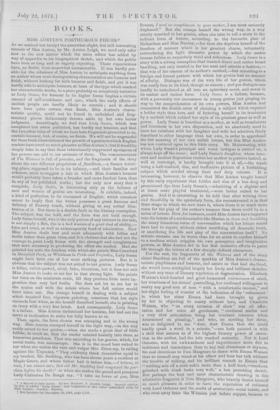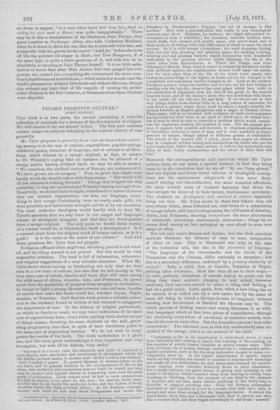BOOKS.
MISS AUSTEN'S POSTHUMOUS PIECES.* As we noticed- but latelyt the somewhat slight, but still interesting memoir of Miss Austen, by Mr. Austen Leigh, we need only refer now to the new matter which the same editor has added by
way of appendix to his biographical sketch, and which the public have been so long and so eagerly expecting. Those expectations
have, no doubt, been somewhat unreasonable. It was hardly pos- sible for the admirers of Miss Austen to anticipate anything from an author whose most distinguishing characteristics are humour and finish, without looking for both humour and finish, and yet it was hardly safe to anticipate humour, at least of the type which marked her characteristic works, in a piece probably so completely tentative
as Lady Susan, for humour in its higher forms implies a certain
amount of self-confidence and ease, which the early efforts of modest people are hardly likely to contain ; and it should have been quite certain that finish, Miss Austen's charac- teristic quality, could not be found in unfinished and frag- mentary pieces deliberately thrown aside by her own better
judgment. Accordingly, we find that Lady Susan, which was completed but never published, has hardly any humour, and that the two other tales of which we have here fragments presented to Us,
contain- humour, but, of course, no finish. We will not be ungrateful for these fresh illustrationsof the growth of a genius to which English readers have owed so mUch pleasure as Miss Austeu's ; but it would be simply false to say that these intentionally suppressed specimens of
her powers can add to our estimate of them. The commencement of The 1Vatsons is full of promise, and the fragments of the story about the two different proprietors of .,Santliton,—a Sussex water-
ing-place, supposed to be in its iufancy,—and their families and schemes, seem to suggest a tale in which Miss Austen's humour would probably have taken a broader and more farcical form than in any of her published 'works; but the only new story that is
complete, Lady Susan, is interesting only as the failures of men and women of genius are interesting. It exhibits, indeed, a kind of perfection in its command of English, which somehow seems to imply that the writer possesses a great fineness and delicacy of literary touch, without giving us any actual illus- tration of it. But there is a double fault in the literary conception. The subject was too bold, and the form was not bold enough. Lady Susan herself, who lathe only person of any interest in the tale, is not simply a flirt, she is a bad woman of a good deal of ability,— false and cruel, as well as extravagantly fond of admiration. Now Miss Austen deals best and most adequately with follies and faults rather than great vices, and it is obvious that she had not the courage to paint Lady Susan with the strength and completeness that were necessary to producing the effect she needed. Had she painted her with the freedom with which she paints Miss Crawford in Mansfield Park, or 'Wickham in Pride and Prejudice, Lady Susan might have been one of her most striking pictures. But it is obvious that the subject was not suited to her genius. Lady Susan is feline, velvet-pawed, cruel, false, licentious, but it does not suit Miss Austen to make us see her in that strong light. She paints her vices on the miniature scale, till they produce little more hn- pression than very bad faults. She does not let us see her in the scenes and with the actors where her full nature would have come out. She cramps herself in dealing with a subject which required free, vigorous painting, conscious that her style succeeds best when, as she herself described herself, she is painting on ivory with a very fine brush. And consequently, Lady Susan is a failure. Miss Austen understood her heroine, but had not the nerve or inclination to make her fully known to us. Then, again, the form chosen was cramping and in the wrong way. Mies Austen cramped herself in the right way,—in the way really suited to her genius,—when she made a great deal of little foibles, so much so, that the reader entered heartily into them as humorous paradoxes. That was according to her genius, which, for social traits, was microscopic. She is in the mood best suited to her when she makes the vain and vulgar Mrs. Elton say, in railing against the Tupmane, "They evidently think themselves equal to my brother, Mr. Suckling, who has been eleven years a resident at Maple Grove, and whose father had it before him,-1 believe, at least,1 am almost sure, that old Mr. Suckling had completed the pur- chase before his death;" or when she makes the proud and pompous Lady Catherine De Burgh say, "I take no leave of you, Miss * A Memoir o/ Jane Auseen. By her Nephew, J. Austen Leigh. Second edition. To this is added .‘ Ludy Susan," and fragments or two other unfinished tales, by Mae Austen. London : Bentley.
f See Spectate,' for December 25, 1860, page 1,509.
- - - Bennet, Isend no compliments to your mother, I em most seriously displeased." But she cramps herself the wrong way, in a way utterly unsuited to her genius, when she tries to tell a story in the indirect form of letters, according to the favourite plan of Richardson and Miss Burney,—for then she deprives herself of the freedom of manner which is her greatest charm, voluntarily surrendering the light dramatic power by which she makes human foibles so exquisitely vivid and ridiculous. Lady Susan is a story with a strong conception that wanted direct and rather broad handling, not only treated in far too neat and minute a fashion,— that was of the essence of its author's inethod,—but according to a foreign and formal pattern with which her genius had no manner of affinity. Dialogue was of the very life of her genius, which was really free in its kind, though so minute ; and yet dialogue can hardly be introduced at all into an epistolary novel, and never in its easiest and raciest form. Lady Susan is a failure, because, with a perversity not uncommon in young genius just groping its way to the comprehension of its own powers, Miss Austen had committed the double error of choosing a subject which required a bolder style than hers, and of fettering herself in its treatment by a method which robbed her style of its greatest grace as well as power. Lady Susan is heartless as a mother, as well as treacherous and licentious in her own disposition, and we absolutely need to have her relations with her daughter and with her admirers freely described in other language than her own, in order to apprehend the full meaning of her own selfish letters, but this Miss Austell has not ventured upon in this little story. Mr. Meinwaring, with whom Ledy Susan's principal and worst intrigue is carried on, is always kept off the scene ; and Lady Susan's daughter, whose inno- cent and modest disposition excites her mother to positive hatred, as well as contempt, is hardly brought into it at all,—the result being a half-realized, dim, and ineffective picture of a forbidding subject which needed strong lines and deep colours. It is interesting, however, to observe that Miss Austen taught herself by this early experiment that foibles and sins of a less deep and pronounced dye than Lady Susan's,—admittiug of a slighter and at times more playful treatment,—were better suited to her genius. And it is interesting to be told that after writing Sense and Sensibility in the epistolary form, she reconstructed it in that freer shape in which we now have it, where there is so much more room for the play of the author's humour than there could be in a series of letters. How, for instance, could Miss Austen have imported into the letters of a sentimentalist like Marian in Sense and Sensibility the many humorous turns of conversation which her letters would have had to report, without either sacrificing all dramatic truth, or sacrificing the life and play of the conversation itself ? No artistic mistake can be worse than for an artist to confine himself to a medium which cripples his own perceptive and imaginative powers, as Miss Austen did in her first tentative efforts to paint life through the letters of a few sharply-defined characters. For the rest, the fragments of the 1Vatsons and of the story about Sanditon are full of the sparkles of Miss Austen's charac- teristic playfulness and humour, and assure us that had she lived, she would have multiplied largely her lively and brilliant sketches without any trace of literary repetition or degeneration. Elizabeth Watson's kind-hearted and good-huinoured commonness of mind, her weariness of her sisters' quarrelling, her confessed willingness to marry any good sort of man "with a comfortable income," and her slight feeling of wonder at the indication of the ' refinement ' in which her sister Emma had been brought up given by her in objecting to marry without love, and Charlotte Watson, who "on, every occasion of show" was all affec- tation and her voice all gentleness, "continual smiles and a very slow articulation being her constant . resource when determined on pleasing," and who, on meeting her sister, was so delighted to see "dear, dear Emma that she could hardly speak a word in a minute,"—are both painted in with a skill that assures us of the highest literary power of execu- tion in the author, had the tale reached maturity. Nor is Lord Osborne, with his awkwardness and impertinence more due to indolence and insouciance than to any real clumsiness or shyness, his cool directions to Toni Musgrave to dance with Emma Watson that he himself may stand at hie elbow and hear her talk without the trouble of talking, and his brilliant remark to Emma that "nothing sets off a neat ankle more than a half-boot,—nankeen galoshed with black looks very well," a less promising sketch. But perhaps the best and most characteristic drawing in this admirable fragment is Tom Musgrave, who bravely denies himself so much pleasure in order to have the reputation of intimacy with Lord Osborne and the credit of aristocratic social habits, and who runs away from the Watsons just before supper, because to it down to supper, "to a man whose heart had long been fixed on calling his next meal a dinner, was quite insupportable." There may be in him a reminiscence of the illustrious John Thorpe, that great creation in Northanger Abbey, who tells Catherine Morland, when he is about to drive her out, that she is quite safe with him, and pompously bids his groom let his mare's "head go," before she trots off like the quietest old stager in Bath; but Tom Musgrave, if of the same type, is quite a fresh specimen of it, and bids fair to be absolutely as amusing as John Thorpe himself. It is no little satis- faction to know that after Miss Austen had once gauged her own powers, she carried into everything she commenced the same corn- bined playfulnessand truthfulness,—which make her novels read like kindly pleasantries without bitterness and without illusions, though also without any high ideal of life capable of causing the author either illusions in the first instance, or bitterness when those illusions were dispelled.































 Previous page
Previous page